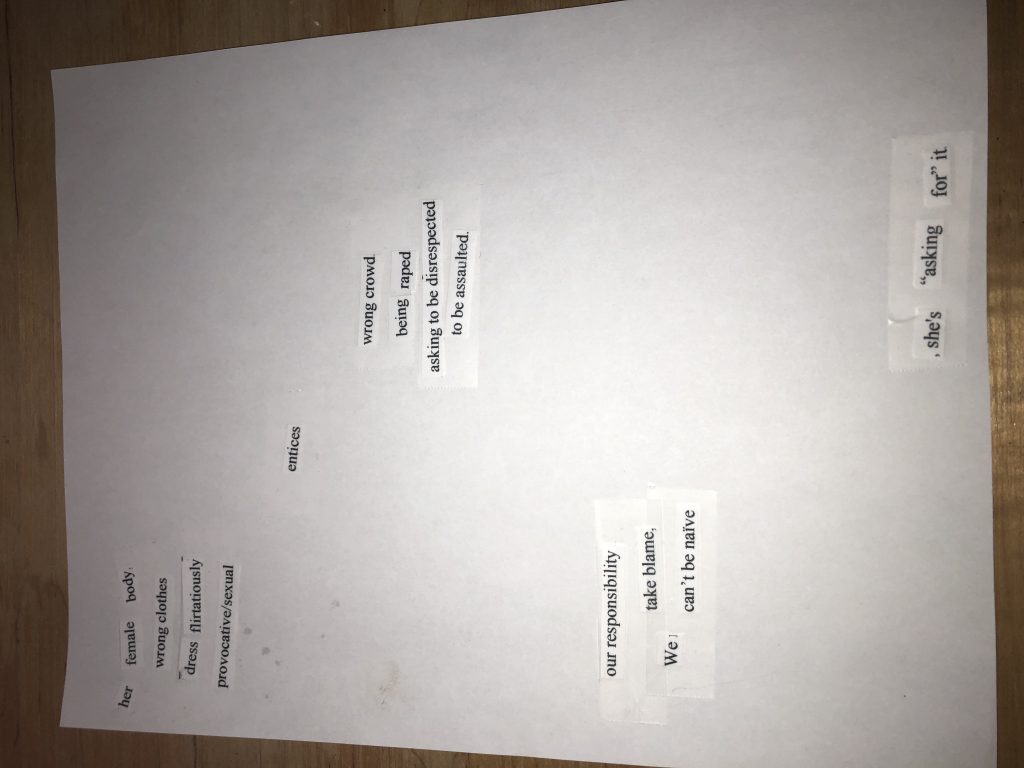By: Kaylee Oliver, Emeilya Erway, Dana Circelli, and Ryan McCann
Historically, the terms “sex” and “gender” have been used interchangeably, but their meanings are becoming increasingly distinct. In biological terms, sex is classified by either male or female, but the definition of gender is more complex. The social and cultural roles associated with each gender is what is used to categorize and set them apart . The term gender is now used more broadly to explain a range of identities that do not correspond to established and historical ideas of what constitutes male and female. Outside of the binary sexual classifications of male and female there is a similar categorization of human beings based on the individual’s personal awareness and identity. To each owns gender there are required pronouns that distinguish the identity one chooses to associate with, having it so a person can choose how specifically they want to be addressed as.
The word gender is derived from the Middle English word ‘gender’, which at the time it was grammatical gender. Grammatical gender meant that every noun was either feminine, masculine or neutral. The Old French word gendre is defined as kind, sort, and a class or kind of persons or things sharing certain traits. It also was defined as the quality of being male or female, which in the twenty first century is considered outdated; gender is no longer restricted to the domains of male and female. In 12c. From modern Modern French came the word genre which means kind, species; character; gender. Genre stems from Latin genus which means race, stock, family; race, kind, species, as well as female or male sex. The use of male or female sex stopped in the early 15c. Seeing as the word sex started to become erotic and no longer fit within the definition. With this happening, by the 20c. gender become the word that was used to describe a persons sex.
Throughout the play, A Raisin in the Sun, Lorraine Hansberry portrays three generations of women through the characters Mama, Ruth, and Beneatha, emphasizing the changing expectations placed on women throughout history.
Mama is the oldest member in the Younger household and is seen as a traditional woman which stems from her being a part of the older generation. She is a strong motivational force for the family tasked with the decision of what to do with the money from the insurance check. Mama also asserts herself as the leading figure for the family by stating, “There are some ideas we ain’t going to have in this house. Not long as I am the head of this family” (Hansberry 54). With Mama being in charge of the family, this is seen as an uncommon practice during the play’s time period as it was usually the male’s role to be the authority figure and in charge of the household. However, at the same time that Mama assumes this powerful position, she also upholds the idea that her son Walter should be the one in charge of household decisions. Mama gives Walter the remaining money in the check and tells him, “It ain’t much, but it’s all I got in the world and I’m putting it in your own hands. I’m telling you to be the head of this family from now on like you supposed to be” (Hansberry 107). Mama admits that she was wrong and feels guilty for not letting Walter take his place as the man of the household. By the end of the play, Mama mentions how Walter “came into his manhood” (Hansberry 124), by putting the needs and wants of his family first before his own.
Ruth portrays the role of a housewife during this time period as she is married to Walter and takes care of the household. However, during this time period, black women did not have the luxury of a single income household and housewives usually consisted of middle and upper class white families which does not represent the Younger family as they were African American and poor. A recent study shows that since the 1980’s, the median wealth among black families has been less than $10,000 which is only 2 percent of the wealth the median of white families own (Collins 2019). Ruth is also faced with a jarring decision on whether or not to get an abortion. This stems from the idea that their current living conditions are already tight and the family having little money to support another child. During the play’s time period, it was illegal for a woman to get an abortion, yet during a conversation with Walter and Mama, she tells him that Ruth is thinking about getting rid of the child. Walter refusing to accept this idea, tells Mama that Ruth would never do that, Mama replies, “When the world gets ugly enough – a woman will do anything for her family” (Hansberry 77). Aborting the baby is a huge sacrifice, albeit an illegal one for Ruth and something that she is willing to do if it ensures a better future for her family.
Beneatha Younger sets herself apart from the other members of the family by battling the societal expectations of getting her dream job and deciding herself on who she is going to marry. Beneatha Younger dreams of one day pursuing a career as a doctor, but struggles to accomplish this as it is the societal norm that women are seen as nurses. Her older brother Walter even goes as far to say “go be a nurse like other women” (Hansberry 41) despite her hardworking efforts to achieve this goal. Beneatha’s family also expects her to marry George Murchison due to his wealthy status as a black American, although she shows a clear love interest towards Asagai. Early in the play, Ruth ask Beneatha why she doesn’t want to marry “That pretty, rich thing.” talking about George, to which she responds, “No I would not marry him if all I felt for him was what I feel now.” (Hansberry 52). Beneatha challenges the role of women in American society by achieving her dreams of becoming a doctor and through her relationships.
Despite being the only male adult within the Younger household, Walter has conflicting issues with each female member in the family. Walter wants to take initiative for the family by opening his own liquor business, but is conflicted when Mama refuses to give him money because it goes against her religious morals. Walter believes that a man should be the leader of the household; however, he struggles because his mother is the one making the decisions and preventing him from opening his business. With Walter’s sister Beneatha, his argument that she shouldn’t become a doctor stems from her being a woman. During a dispute with Beneatha about what is best for the family, he proclaims, “She should not even want to become a doctor….Who in the hell told you, you had to be a doctor? If you so crazy bout messing ‘round with sick people, then go be a nurse like other women – or just get married and be quiet” (Hansberry 41). Walter believes that women are only fit for supporting roles and this belittles Beneatha’s dreams of wanting to become a doctor. Also, Walter tells Beneatha to get married even though she’s not worried about who she is going to marry, nonetheless if she does decide to get married. Finally, Walter feels that he is leaving his wife Ruth dissatisfied and that he should be buying her luxury items, despite not having the money. He states, “Ain’t she supposed to wear no pearls? Somebody tell me – tell me who decides which women is suppose to wear pearls in this world. I tell you I am a man – and I think my wife should wear some pearls in this world” (Hansberry 143). Walter being the man, thinks that he should be able to provide for his wife with luxuries and beautiful things, but by not having the money it makes him feel less like a man.
In studying literature, we can better understand the depth of gender; in turn, through understanding gender we can better analyze the characters and reason in literature. The traditional roles filled by each gender affect the characters we read about and can help explain why they do what they do. This predictability and understanding comes from the fact that each gender’s members share common experiences, and have historically behaved in a similar way in society. In The Woman Warrior by Maxine Hong Kingston, stories are used to portray the memories of Kingston’s growth into adulthood. She tells the story of her aunt, who was shamed into suicide for going beyond the expectations that as a woman, she would be a silent housewife who stayed faithfully within her marriage. When originally told the story of her deceased aunt, Kingston writes that her mother told her, “You must not tell anyone…what I am about to tell you,” (Kingston 3). This quote shows that even in the twentieth century, Kingston’s mother expected her not to speak out of place, and still believed the sexual freedom of the aunt was something to be ashamed of. Knowing the potential fear generated by the horror story of her aunt’s fate, readers can understand Kingston’s rejection of common female roles.
Through literature, authors can show the complications that stem from harmful gender stereotypes. “Even now, unless I’m happy, I burn the food when I cook. I do not feed people. I let the dirty dishes rot” (47). She burns food so as to reject the stereotype that women belong in the kitchen, and she isn’t overly social so as to avoid the stereotype that women serve as hostesses in a social setting. By telling her aunt’s story, Kingston fights against the idea that women should be silent and go unnoticed. Authors like Kingston can use their words to fight back against what is assumed about a gender, but not true to all of its members. By going against what people expect and embracing the qualities of who they are, writers are able to provide insight into the many facets of each gender.
It is important to understand gender when analyzing literature because it provides readers with a greater understanding of characters within the stories they read. Without knowing the traditional expectations of each gender role among differing cultures, socioeconomic levels and even races, readers are unable to fully grasp deeper concepts within the work. Within literature, gender roles play an important part in the reader understanding the characters for the time and place that the book was written and takes place in. Gender roles also come into play when it comes to the authors. By knowing the author’s gender, too, the reader is able to see the differences between writing styles; the intention of each author in portraying gender related themes and issues through their writing is more evident to the reader. Writing style can be affected by the author’s feelings and experiences revolving around gender. When we as readers more thoroughly understand gender itself, we are more effective at finding meaning and depth in literature.
Works Cited
Collins, Chuck. “New Study Says the Median Black Family Will Have Zero Wealth by 2082.”
InTheseTimes, 31 Jan. 2019, https://inthesetimes.com/working/entry/21705/race-wealth-gap-black-family-inequality-white-economy-united-states
“Gender, n.” Gender, n. : Oxford English Dictionary, https://www.oed.com/view/Entry/77468?rskey=A7sfMq&result=1#eid.
“Gender (n.).” Index, www.etymonline.com/word/gender.
“Gender.” Merriam-Webster, Merriam-Webster, https://www.merriam-webster.com/dictionary/gender
Hansberry, Lorraine. A Raisin in the Sun. Methuen Drama, 2018.
Image by Peggy_Marco
Kingston, Maxine Hong. The Woman Warrior. Vintage International, 1976.
Medical News Today, MediLexicon International, 7 Feb. 2018, https://www.medicalnewstoday.com/articles/232363.php.
Newman, Tim. “Sex and Gender: Meanings, Definition, Identity, and Expression.”


